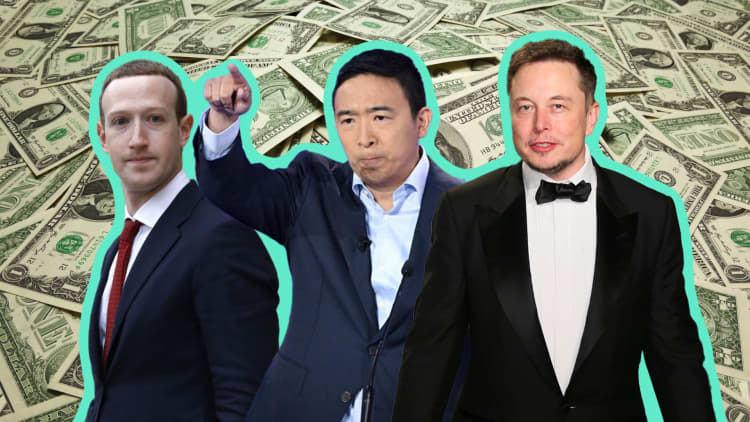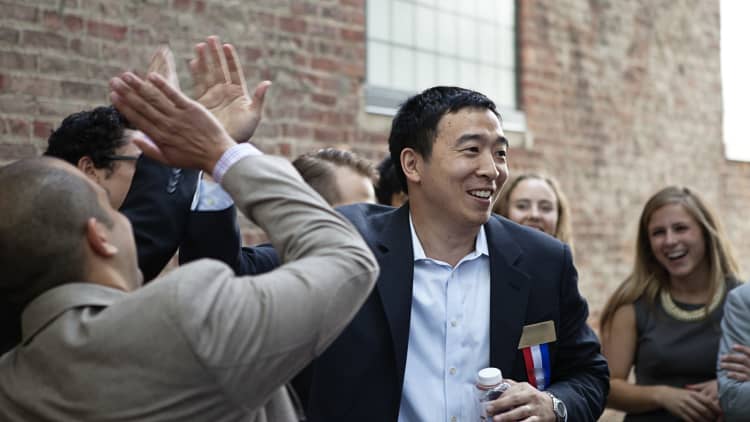Presidential candidate Andrew Yang raised $16.5 million in the fourth quarter of 2019 alone. While it's much less than the $34.5 million Vermont Sen. Bernie Sanders raised, for example, Yang's campaign has become a surprise success based largely on one idea: giving Americans a $1,000 per month universal basic income payment.
Yang's platform helped get America talking about universal income again, but his plan is expensive. Now a think tank has laid out a universal basic income plan that would pay more than Yang's and be zero cost to the government. Here's what it would look like and who it could actually benefit.
Yang's plan is expensive
While the idea of a cash payment for U.S. citizens over the age of 18 has catapulted Yang from virtual obscurity to a contender (though he's not appearing in Tuesday night's Democratic debate in Iowa), it's very often met with the same criticism: It's too expensive.
According to one estimate, Yang's universal basic income would cost $2.8 trillion a year — an estimated 236 million adult citizens in the United States multiplied by a $12,000 yearly payment. (With Yang's plan welfare and social program beneficiaries could choose to keep their benefits in lieu of receiving the cash payment, so number of adults receiving it could vary.)
To pay for the plan, dubbed the "freedom dividend," Yang has proposed things like a 10 percent value-added tax (VAT) on the production of goods or services (the majority of countries already have a VAT), a higher capital gains tax and removing the Social Security tax cap.
However those numbers don't add up according to a July analysis of Yang's plan by Kyle Pomerleau, then the chief economist and vice president of independent nonprofit Tax Foundation (now of the think tank American Enterprise Institute). Pomerleau found that to work, Yang's VAT would have to increase to 22 percent and the payment would have to decrease to $9,000 per year or $750 per month.

(Yang's campaign says "the Tax Foundation's analysis makes some flawed assumptions" and does not take things like resulting economic growth from the payment into account, S.Y. Lee, national press secretary for Yang, tells CNBC Make It. Pomerleau, however, tells CNBC Make It that Yang's campaign is unreasonably optimistic in the amount of revenue it hopes to get from the tax income on economic growth and about other revenue sources.)
There is a plan that won't cost the government anything
There is, however, a universal basic income plan that is budget neutral, meaning it does not raise or lower the spending of the government.
The plan, which is only theoretical, was released by the American Enterprise Institute (where Pomerleau now works) on Jan. 6 and provides for a universal basic income payment of $15,845 per year, or $1,320 a month, to U.S. residents 18 or older. For individuals under 18, the plan provides for a $7,923 per year payment, or $660 per month.
A graphic visualization of the variable impact of a budget-neutral UBI as described by AEI across income levels. Source: AEI.
However, to make the plan budget-neutral, the American Enterprise Institute proposal repeals benefit programs, from Medicare and Social Security to veterans' benefits and disaster relief. It also removes a long list of deductions and credits from the tax system, including the ability to write off medical expenses and business losses. (The full list of things that would be repealed is extensive.)
And the plan would have a net benefit to only some people.
"In general, the budget-neutral UBI would be detrimental to those at the very bottom and the very top of the income distribution, and beneficial to those in the middle of the income distribution," Matt Jensen, a co-author of the AEI's working paper, writes.
For those earning less than $10,000 a year in wages, the UBI program would end up costing them an average of $12,316 a year, according to AEI. That's because the social, welfare and tax benefits they would be losing are more valuable than the UBI payment.
Those earning wages of more than $1 million per year would pay, on average, $101,249 more in income tax per year, due to lost tax benefits in exchange for the UBI payment.
Those who have income of between $10,000 and $1 million per year would see an increase of between $5,000 and $14,000 per year in the total amount of money they take home thanks to the UBI payment.
Generally, supporters of UBI argue that "universal cash benefits from the government would address at least one of three policy dilemmas: economic inequality, technology replacing human workers, and transfer program inefficiencies," writes Jensen in the AEI's report.
Critics, however, say that a universal basic income is not only expensive, but disincentives work and undermines the structure and meaning that humans get from their vocation.
The AEI's report is an update of a 2017 working paper by Will Ensor, Anderson Frailey, Matt Jensen, and Amy Xu, entitled "A budget-neutral universal basic income," that takes into account changes in the tax code and government spending on social programs.
See also:
Why everyone is talking about free cash handouts—an explainer on universal basic income
Elon Musk: Robots will take your jobs, government will have to pay your wage
This California city's 27-year-old mayor will give residents $500 free cash per month

Like this story? Subscribe to CNBC Make It on YouTube!


